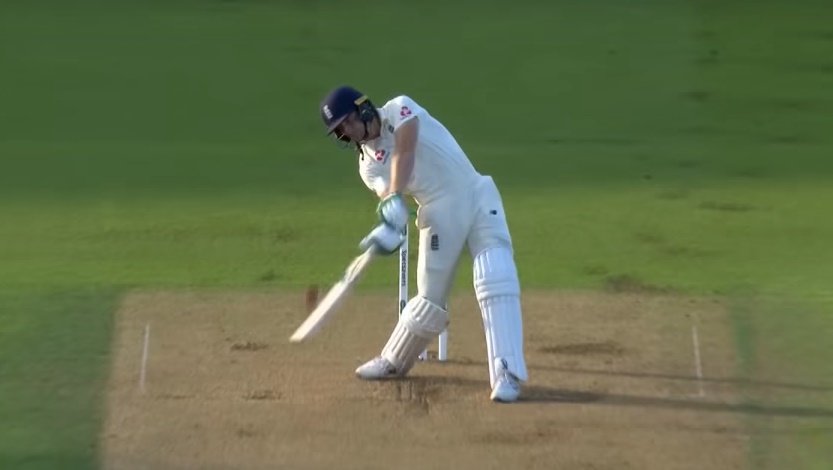
After watching Jos Buttler hit over a third of the deliveries he faced for boundaries against Pakistan, it’s tempting to wonder whether maybe, just maybe, he might do well to shelve his watchful, deliberate approach to Test batting. It seems to us that he’s much, much safer at the crease, and far more reassuring for England fans watching, when he’s just standing there spanking sixes, all bionic eyes and adamantium wrists.
The responsible approach
For Buttler, getting down on one knee and ramping the ball over the wicketkeeper is ‘playing responsibly’. When he tries to play the ball on its merits, he suddenly looks all too frail. Forget it, Jos. Most people have to respect the bowling, but you don’t. In fact it’s very much advisable that you don’t. Disregard the merits of the ball, disrespect the bowling. We promise to vilify you if you’re dismissed playing a forward defensive stroke and we’ll overlook all caught-at-cow-corners.
But how you persuade a batsman to employ such an approach is another matter altogether. It’s not like England are telling Buttler not to bat like this. We daresay someone involved with the side’s noticed that he plays rather better when he’s liberated. The problem is you can’t just say ‘play positively’. We’ve covered this before. You somehow need to persuade the person in question that this is what you want and that they will benefit from that approach. Even if those are a given, as they perhaps are in this case, it’s still not an easy matter putting it into practice.
The myth of ‘his natural game’
Test matches are different. The range of possiblities is far greater and your range of options as to how to approach an innings is far greater. One-day cricket – particularly in the later overs – is gloriously simple. There is no batting clarity quite like the batting clarity you have at 300-4 with five overs to go.
People often talk about a batsman’s ‘natural game’. Strikingly, they rarely refer to a deadbatting grinder when they use this term – it’s always the quick-scorer. This leads to many people concluding that when such a batsman isn’t lofting every third ball into the stands, they’re somehow having a different approach imposed upon them.
It happened in the World Cup when many assumed that Peter Moores wasn’t allowing certain batsmen to ‘play their natural game’. This was bollocks. He didn’t tell them not to – quite the opposite – he simply failed to create an environment in which they felt free enough to do so. The gleeful carnage is not the default. It’s only natural in certain circumstances.
Which brings us back to Test cricket
With so many options, so many ways of unpicking the puzzle before you, a batsman can find himself caught in some noncommittal middle ground in Tests (and shortly afterwards, he might find himself caught in a more literal sense.) One of the keys to Test batting is to find a way of navigating all of this; of somehow imposing clarity on your own brain.
The main thing preventing Jos Buttler from taking his one-day batting ability into Test matches isn’t the coach or ‘management’ – it’s Jos Buttler’s brain. If you think that the brain is an unnatural extra element when it comes to the act of batting, then yes, it is indeed preventing him from playing his natural game.
The other way of looking at it is that Jos Buttler isn’t so naturally predisposed to the thought processes necessary for Test cricket as some are. He might bat like some otherworldly warlock in the shorter formats, but he’s naturally confused and awkward when presented with more options. Hopefully he can learn to overcome this. Jos Buttler’s unnatural Test batting would certainly be worth waiting for.





Basically I agree, but three additional points.
It is no surprise therefore that Buttler can thrive under Morgan’s captaincy – another player who unquestionably gets the short form format and struggles (for no apparent reason) to get the longer form of the game.
The decision to promote Buttler up the order in the last match, in the light of the superb platform built by the top order, was high class. Probably not Morgan alone but very much the sort of decision I understand emerging from the Morgan/Bayliss/Farbrace mentality and I applaud it wholeheartedly. It was a good idea, even if it hadn’t come off. As it did come off, it was a brilliant, masterful idea.
I also think Jos Buttler was basically out of form for the tests and has found his way back into form during the ODI series. Even the best players do go in and out of form. That is a dull observation but is also part of the explanation, regardless of the other more interesting factors.
You won’t get no agreement from me on the opposite of what you said. Not.
There is some experimental evidence that your brain makes most decisions for you, and then lets your consciousness be aware of it a few seconds later, with the added twist that your consciousness is allowed to think it was in charge. In any case, actively attempting to let your conscious mind make split-second decisions is guaranteed to mess things up.
We could see this with the Australians this summer. With brains telling them to drive everything pitched up, because that usually works fine for them, they were completely unable to leave these most dangerous of deliveries in wobbly conditions. Ergo, sixty all out, not because they were rubbish, but because they weren’t playing the game their brains were used to.
It is possible for a player to have two natural games, and to be able to switch between them. But this again has to be a natural switch, not a forced one. It is also the mark of a true great of the game – Ponting, Dravid, Lara. If we’re casually expecting the same from Buttler, we are asking rather a lot.
I think what you’re talking about is ‘System 1’ vs ‘System 2’ thinking, to use Daniel Kahneman’s terminology. Not sure if he ever did any analysis of batting collapses, though.
I can’t think of many other English players who are widely accepted as among the most talented and exciting of their generation, but only made it at the highest level in ODIs.
Michael Bevan springs to mind, that sort of thing.
Nicholas Verity Knight had an excellent ODI record: average over 40, the strike rate of 71.5 wasn’t bad for the time, almost a carbon copy of Thorpe’s 71.2. First class average of 44, with a triple century to his name. But in Tests, a Bevanesque average below 24.
My favourite thing about Michael Gwyl Bevan’s test career isn’t that such a brilliant batsman could average a measly 29, or even his excellent middle name, but that he bowled chinamen well enough to snag 29 wickets at 24, including a (match) ten-fer. If batting average > bowling average, you’re technically an “all-rounder”, right?
Graeme Hick?
Well that’s the India-Pakistan negotiations buggered up then.
I know all about this phenomenon and it’s a tricky, strangling, goading fool of a thing. Last week I was feeling particularly exultant (I’d just been listening some best of Erasure) and then hunger came across me, captured me if you will. I was left with a hankering. I strode down to the newsagent (ten minutes away when striding with intent) with a simple, clear mantra running through me head: ‘Gonna get me a Double Decker, gonna eat it in my mouth.’
I swung into the newsagents and the woman behind the counter said, ‘We’re closing now love, grab what you want quickly.’
And then, well I fell apart. Facing the rack of chocolate, the almost boundless choice, with the lady behind the counter tapping her fingers impatiently on the counter, King Cricket, I panicked. My eyes began to sweat, Bryan Adams’s ‘Run to You’ started blasting in my head (I have no idea why, the last time I’d heard it was a family holiday in Scarborough in 92) and I moved forward and my hand reached out and seemingly without my consent selected a bar of chocolate.
I walked home with my head hanging, my cheeks burning red in embarrassment and frustration, my legs sombre and weak beneath me. In my pocket shamefully rested a Toffee Crisp. A Toffee Crisp.
All we can say is that it’s possible to develop these skills over time. Tomorrow is a new day.
The mood might not be quite the same, but if you can practise getting you a Double Decker and eating it in your mouth – perfecting that art – then maybe next time that Blue Savannah precipitated perfect storm comes about, you’ll be in a position to properly exploit it.